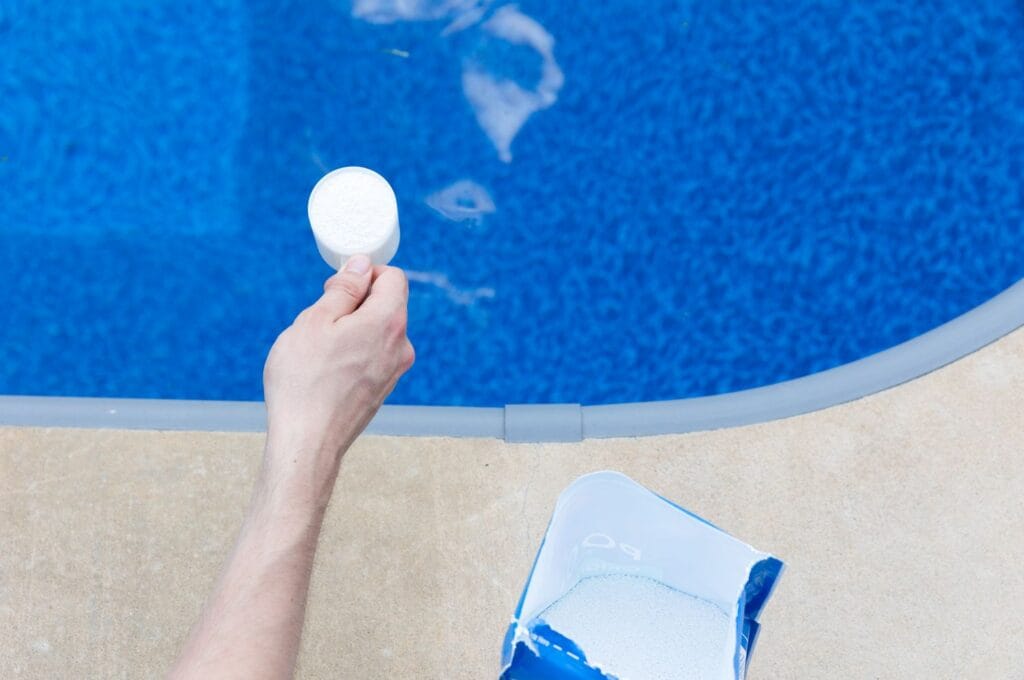Learn about What Is a Stabilizer for Swimming Pools. Find out what a pool stabilizer is and how cyanuric acid protects chlorine from UV rays, keeping your swimming pool clean, clear, and cost-efficient.
Maintenance and care of swimming pools never stop as they continuously require to be clean, clear, and safe for swimmers. Pool water chemistry typically ignores one side of it: the requirement of that chemical known as stabilizer or cyanuric acid. The essence of pool ownership for those who intend to keep the perfect balance for pool water is understanding what a stabilizer does and how it operates.
What Is a Stabilizer for Swimming Pools?
The stabilizer chemical compound-free, mainly cyanuric acid, protects the chlorine from degradation by the device of ultraviolet rays from the sun. In the absence of stabilizer chlorine, it tends to lose its effectiveness and become inactive for pool disinfection. It acts for chlorine like a sunscreen, preventing it from degradation and allowing for prolonged disinfection action in your water, fighting against bacteria, algae, and other contaminants.
Types of Pool Stabilizers
1. Stabilized Chlorine
Chlorine stabilized with cyanuric acid protects sanitation and ultraviolet rays. Typical forms are in tablets or granules. It’s what outdoor pools need for the chlorine to disappear in sunlight.
2. Liquid Stabilizer
Liquid stabilizer is a pre-dissolved form of cyanuric acid that quickly spreads in pool water. Easy to apply, fast-acting, and suitable for the UV protection of chlorine required immediately, thus it suits this kind of pool owner the best.
3. Powder Stabilizer
The powder stabilizer represents the granular-like form of cyanuric acid. It can be pre-dissolved or added to the skimmer, which keeps the stabilization process long-lasting but effective.
Why Is Stabilizer Important?
Applying a stabilizer in outdoor pools is very important for multiple reasons.
1. Protects Chlorine from UV Degradation
A stabilizer must be employed to prevent the fast loss of chlorine through sunlight. To inhibit rapid losses, cyanuric acid keeps an even level of chlorine.
2. Reduces Chlorine Usage and Cost
Because stabilizers keep chlorine from evaporating quickly, less chlorine is needed overall, and more money is saved on pool upkeep.
3. Maintains Sanitizing Effectiveness
Maintaining a stable chlorine level preserves its ability to keep the water in your pool clean, safe, and without algae.
4. Improves Pool Water Balance
Stabilizers help keep the pool water clear and balanced when the chlorine levels are maintained.
How Much Stabilizer Should You Use?
Keeping the cyanuric acid level right is very important for the overall pool chemistry.
- Ideal stabilizer concentration: The concentration is usually about 30-50 parts per million (ppm).
- Too little stabilizer: Sunlight will break down chlorine very quickly.
- Too much stabilizer: Chlorine lock is a condition that can happen when chlorine is inadequate and has a lack of sanitizing effectiveness with suitable chlorine levels.

How to Add Stabilizer to Your Pool
- Find Out Current Cyanuric Acid Level by Testing Your Pool Water.
- Determining how much stabilizer will be needed to reach an ideal level (generally around 30-50 ppm).
- A stabilizer is usually added directly into the pool water; however, some recommend dissolving it in a bucket of warm water first for better distribution.
- Add it in slow streaks around the perimeter of the pool with the pump circulating the water.
- Test again after some days for confirmation of stabilizer levels.
Benefits of Using Stabilizer in Pools
Protects chlorine from UV degradation
Stabilizer (cyanuric acid) protects chlorine from being destroyed in sunlight quickly; hence, it prolongs the the effectiveness of pool water sanitation the period of sanitation, causing chlorine additions to be needed less often.
Maintains consistent chlorine levels
The stabilizer, meant to slow down the loss of chlorine, helps in giving stable chlorine levels in the pool. Because chlorine levels are consistent, sanitation is improved and swimming conditions are made much safer, with no need for constant monitoring or adjustment.
Reduces chemical costs
Stabilizer ensures the longest possible duration of chlorine, in this case, thus requiring less in total. Less chemical expense and less frequent added chlorine time contribute to conserving money in pool maintenance and maintenance costs.
Improves water clarity and hygiene
Proper chlorine levels in the water help prevent bacteria and algae from growing,, which makes the pool safer and cleaner. This improves the fun of swimming and reduces the chances of getting sick.
Prevents chlorine overuse and irritation
Stabilizer prevents chlorine from being lost, which means you can use less chlorine. For this reason, the high chlorine in the water won’t bother your skin and eyes as much, which makes swimming more fun.
Potential Downsides of Pool Stabilizer
- With too much cyanuric acid, chlorine does not work well, and bacteria and algae tend to grow anyway.
- Cyanuric acid may build up gradually and be hard to lessen without partially lowering the water level in the pool.
- There is very little UV damage in indoor pools or pools with plenty of shade, so it is not needed.
When to Avoid or Reduce Stabilizer Use
- Pools that are mostly shaded or indoors won’t usually need stabilizer.
- Chlorine will not kill algae as well if the cyanuric acid in the pool water goes above 70 ppm. The solution is usually to partially empty the pool and top it up with new water.
- Alternative sanitizers used in pools could mean that pool owners need different maintenance steps.
Conclusion
You should use pool stabilizer (cyanuric acid) to protect chlorine from the sun and keep your outdoor pool cleaner for longer. By correctly balancing stabilizer levels, you use less chlorine, the water stays clear, and hygiene is preserved, both for your safety and comfort while swimming.
